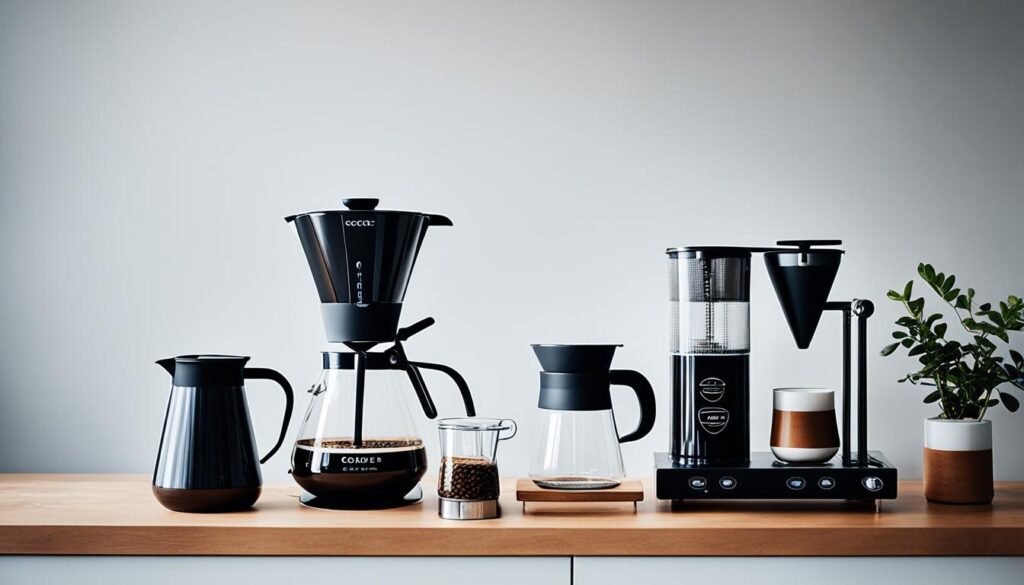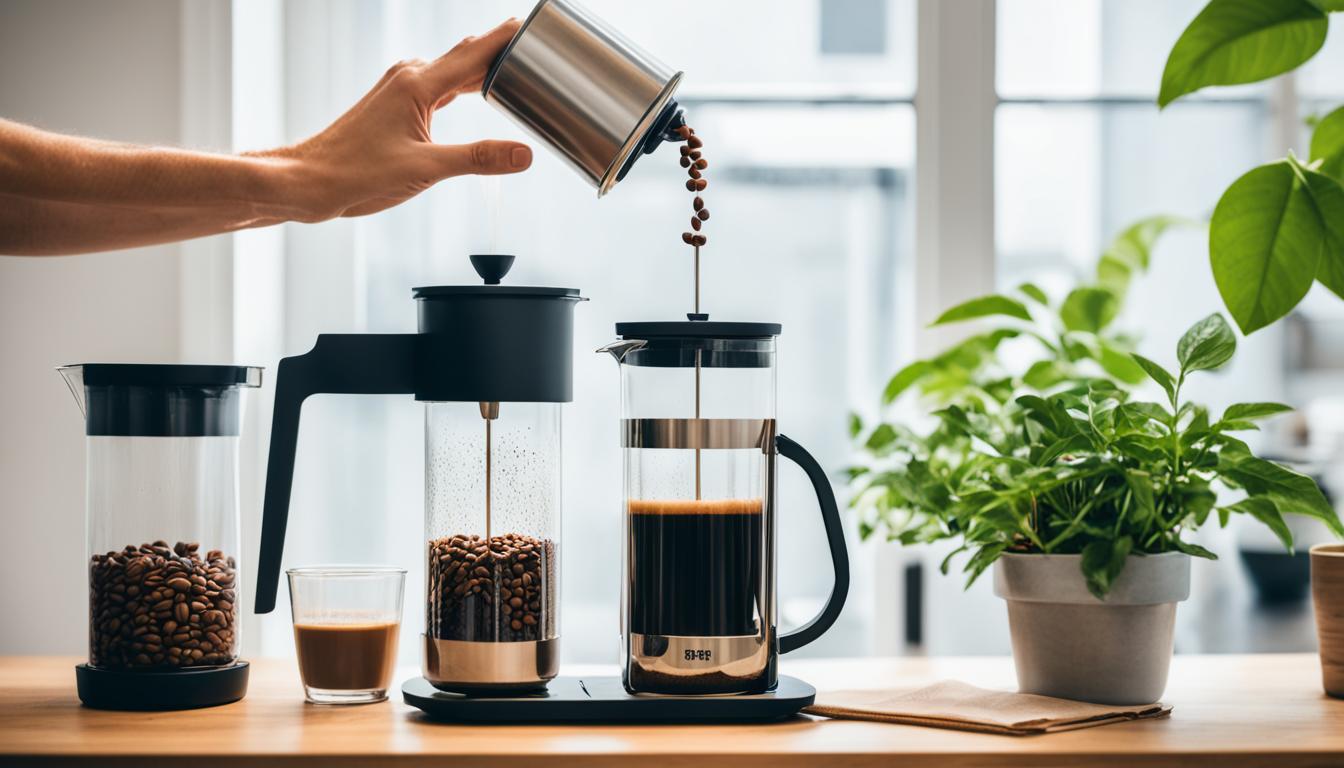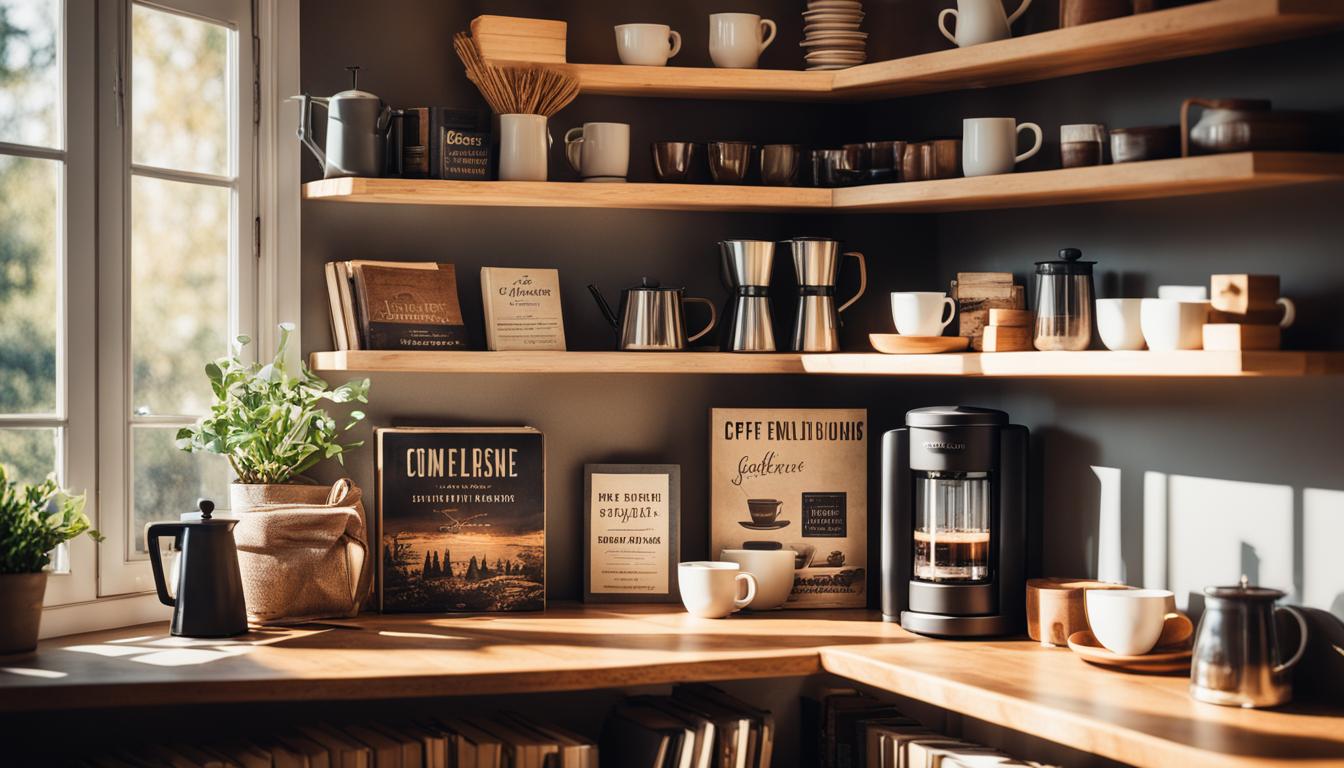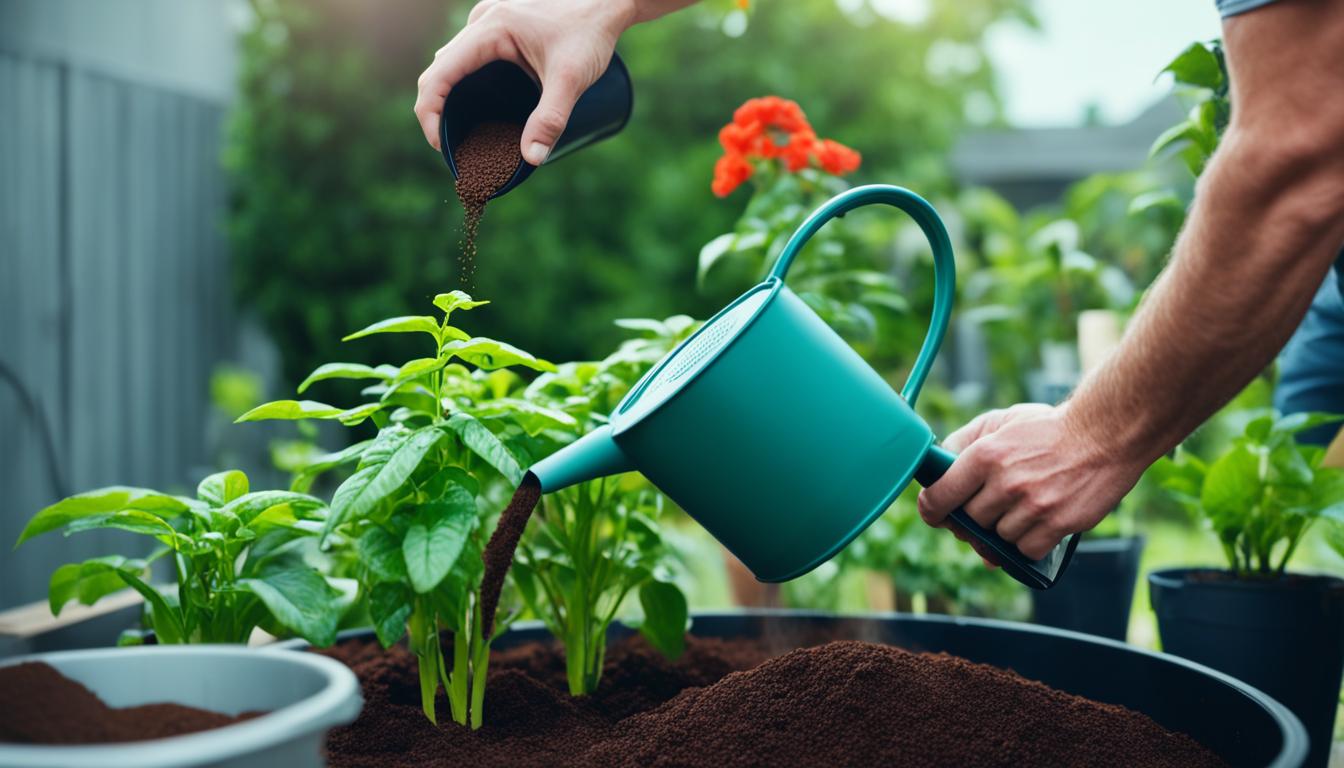Welcome to our guide on sustainable coffee brewing at home. In this section, we will explore eco-friendly coffee brewing methods and techniques that you can easily implement in your own kitchen. By adopting sustainable practices, you can enjoy your daily cup of joe while minimizing your ecological footprint.
As coffee lovers, we understand the importance of both delicious flavor and responsible sourcing. That’s why we’re excited to share these tips on sustainable coffee brewing with you. Let’s dive in!
Key Takeaways:
- By choosing organic coffee beans, you can support sustainable farming practices and minimize exposure to harmful chemicals.
- Investing in eco-friendly coffee brewing equipment and accessories can reduce waste and energy consumption.
- Implement environmentally friendly brewing techniques such as adjusting water temperature and brew time to minimize waste and maximize flavor.
- Embrace ethical coffee habits by supporting fair trade certifications and coffee farmers who prioritize social and environmental responsibility.
- By following these tips, you can enjoy your coffee while making a positive impact on the environment and the communities behind your favorite cup.
Choosing Organic Coffee Beans for Sustainable Brewing
When it comes to sustainable coffee brewing, choosing organic coffee beans is a crucial step. Organic coffee not only benefits the environment but also enhances the taste and quality of your brew. In this section, we will explore the importance of organic coffee, provide tips on how to identify organic coffee beans, and offer insights on sourcing sustainable coffee beans for your home brewing setup.
The Benefits of Organic Coffee
Organic coffee is grown without the use of synthetic pesticides, herbicides, or fertilizers. This farming approach helps maintain soil health, supports biodiversity, and protects the surrounding ecosystems. By choosing organic coffee, you are making a conscious effort to promote sustainable agricultural practices and contribute to a healthier planet.
In addition to its environmental benefits, organic coffee offers a range of taste advantages. The absence of chemical residues allows the natural flavors and aromas of the coffee beans to shine through, resulting in a more nuanced and enjoyable cup of coffee. Moreover, organic coffee is often shade-grown, which means it is cultivated under the canopy of trees. This shade encourages a slower maturation process for the coffee cherries, leading to a richer and more complex flavor profile.
Identifying Organic Coffee Beans
It’s important to be able to verify whether the coffee beans you purchase are truly organic. Look for labels or certifications from reputable organizations such as the United States Department of Agriculture (USDA) or Fairtrade International. These certifications ensure that the coffee has been produced following strict organic guidelines and that the farmers have received fair wages for their work.
Another method to identify organic coffee beans is to look for the “100% Organic” label on the packaging. This indicates that the coffee beans are made entirely from organically grown beans. If the label states “Organic,” it means that at least 95% of the beans are organic. Additionally, some brands may advertise their commitment to sustainability through eco-friendly packaging or transparent sourcing practices.
Tips for Sourcing Sustainable Coffee Beans
When sourcing sustainable coffee beans for your home brewing, consider the following tips:
- Support local roasters or specialty coffee shops that prioritize sustainability and offer organic coffee options.
- Look for direct-trade or fair-trade coffees, as they often support small-scale farmers and ensure ethical working conditions.
- Consider purchasing coffee beans with Rainforest Alliance or Bird-Friendly certifications, as these guarantee sustainable farming practices.
- Explore subscription services that focus on sustainably sourced and organic coffee beans, providing a convenient way to discover new flavors while supporting responsible coffee farming.
By following these tips and diligently investigating the origins of your coffee beans, you can make informed choices that align with your values and support a more sustainable coffee industry.
In the next section, we will delve into eco-friendly coffee brewing equipment and accessories. Discover innovative products that can further enhance your sustainable brewing journey.
Eco-Friendly Coffee Brewing Equipment and Accessories
When it comes to sustainable coffee brewing, using eco-friendly equipment and accessories can make a significant difference. By opting for products that are designed with the environment in mind, we can reduce waste, conserve energy, and promote greener coffee brewing practices. In this section, we will explore some of the sustainable options available, including reusable coffee filters, energy-efficient coffee makers, and eco-friendly coffee grinders.
1. Reusable Coffee Filters
Disposable paper filters may be convenient, but they contribute to unnecessary waste. Switching to reusable coffee filters can help reduce our environmental impact. These filters are typically made from stainless steel or cloth and can be easily cleaned and reused. Not only do they cut down on paper waste, but they also impart minimal to no flavor to your brew, ensuring a pure coffee taste.
2. Energy-Efficient Coffee Makers
Investing in energy-efficient coffee makers is another way to ensure a greener coffee brewing process. Look for machines that have an ENERGY STAR rating, which indicates that they meet strict efficiency guidelines. These coffee makers are designed to use less power during the brewing cycle, resulting in reduced energy consumption without compromising on the quality of your brew.
3. Eco-Friendly Coffee Grinders
Coffee grinding is an essential step in achieving the perfect brew, but it can also consume a significant amount of energy. Opting for eco-friendly coffee grinders can help reduce energy waste. Look for manual grinders that require no electricity to operate or electric grinders that are designed with energy-saving features. These greener alternatives ensure that you can enjoy freshly ground coffee without leaving a large carbon footprint.
“Using eco-friendly coffee brewing equipment and accessories not only benefits the environment but also enhances the overall coffee brewing experience.”
A Comparison of Sustainable Coffee Brewing Equipment and Accessories
| Equipment/Accessory | Sustainability Features |
|---|---|
| Reusable Coffee Filters | – Reduces paper waste – Reusable and washable – Minimal flavor transfer |
| Energy-Efficient Coffee Makers | – ENERGY STAR rated – Reduced energy consumption – High-quality brewing |
| Eco-Friendly Coffee Grinders | – Manual or energy-saving electric options – Reduced energy waste – Freshly ground coffee |
By incorporating these eco-friendly coffee brewing equipment and accessories into your routine, you can enjoy a delicious cup of coffee while minimizing your environmental impact.

Implementing Environmentally Friendly Brewing Techniques
If you’re looking to make your coffee brewing process more environmentally friendly, there are several techniques you can adopt at home. By making simple adjustments to your water temperature, brew time, and reducing water waste, you can minimize the environmental impact of your coffee brewing routine.
Adjusting Water Temperature
One way to practice environmentally friendly coffee brewing is to adjust your water temperature. Optimal brewing temperature can vary depending on the type of coffee beans you’re using. Generally, a water temperature between 195°F and 205°F (90°C to 96°C) is recommended for achieving the best flavor extraction without over-extraction. Avoid using boiling water, as it can lead to a bitter taste and waste energy. By finding the right temperature for your preferred coffee beans, you can optimize the flavor while reducing the energy required to heat the water.
Optimizing Brew Time
The brew time also plays a crucial role in the coffee extraction process. Experiment with different brew times to find the perfect balance between flavor and efficiency. Brewing coffee for too long can result in over-extraction and a bitter taste, while brewing for too little time may lead to under-extraction and a weak flavor. Finding the optimal brew time for your taste preferences can help minimize waste and make your coffee brewing process more environmentally friendly.
Minimizing Water Waste
Reducing water waste is another essential aspect of environmentally friendly coffee brewing. Here are a few tips to help you minimize water waste:
- Use a proper coffee-to-water ratio: By following the recommended coffee-to-water ratio, you can ensure that you’re not wasting excess water during the brewing process.
- Avoid overfilling the water reservoir: Only fill the water reservoir with the amount of water you’ll need for your desired number of cups. This prevents unnecessary water waste.
- Consider using a small-batch brewing method: If you often find yourself brewing more coffee than you need, consider using a small-batch brewing method or a single-serve coffee maker to avoid wasting excess coffee and water.
By implementing these environmentally friendly brewing techniques, you can enjoy your daily cup of coffee while reducing your ecological footprint. So let’s make a positive impact on the environment one brew at a time!
Embracing Ethical Coffee Habits
At [Brand Name], we believe that ethical coffee brewing at home is not just a trend, but a responsibility we all share. By making conscious choices, we can contribute to a sustainable coffee industry that supports both farmers and the environment. In this section, we will explore the importance of ethical coffee habits and provide practical ways to make a positive impact.
The Power of Fair Trade Certifications

One of the key ways to ensure ethical coffee brewing at home is to look for fair trade certifications. These certifications guarantee that the coffee you purchase comes from farms that meet strict social, economic, and environmental standards. By supporting fair trade, you are directly contributing to the well-being of coffee farmers and their communities.
“Choosing fair trade coffee allows me to enjoy my daily cup of coffee with peace of mind, knowing that I am supporting farmers who are treated fairly and paid a fair price for their hard work.”
Supporting Sustainable Farming Practices
In addition to fair trade certifications, it is essential to support coffee farmers who prioritize sustainable farming practices. Look for brands that engage in organic farming, as this reduces the use of harmful pesticides and promotes biodiversity. By supporting sustainable farming, you are contributing to the preservation of natural resources and promoting healthier ecosystems.
Conscious Consumer Choices
As consumers, we have the power to drive change through our choices. When selecting coffee beans for home brewing, opt for brands that are transparent about their ethical sourcing practices. Consider the company’s commitment to environmental sustainability, worker’s rights, and community development. By choosing ethically sourced coffee beans, you are directly supporting a better future for coffee farmers and the planet.
Direct Trade and Building Relationships

Another way to embrace ethical coffee habits is through direct trade. This model fosters a close relationship between coffee producers and roasters, ensuring fair prices for the farmers and higher quality coffee for consumers. By connecting directly with coffee farmers, roasters can establish long-term partnerships that benefit everyone involved in the supply chain.
“Direct trade coffee not only tastes amazing, but it also gives me the assurance that the farmers behind it are being treated well and fairly compensated for their hard work.”
By embracing ethical coffee habits, you can savor your morning brew with the knowledge that it was made with respect for both people and the planet. Join us in creating a sustainable coffee industry by choosing fair trade, supporting sustainable farming practices, and fostering direct relationships with coffee farmers.
Conclusion
In conclusion, by following these eco-friendly coffee tips for home brewers, you can enjoy your daily coffee ritual while contributing to a more sustainable world. Embrace greener, ethical coffee habits today and make a positive impact on the environment and the communities behind your favorite cup of coffee.
FAQ
What are some sustainable coffee brewing methods I can implement at home?
There are several eco-friendly coffee brewing methods you can try at home. Some popular options include using a French press, pour-over method, or a manual espresso maker. These methods reduce energy consumption compared to electric coffee makers and often have reusable components, eliminating the need for disposable filters.
How can I choose organic coffee beans for sustainable brewing?
When selecting organic coffee beans, look for certifications such as USDA Organic or Fair Trade. These certifications ensure that the coffee beans were produced using sustainable farming practices and without the use of harmful chemicals. Additionally, consider purchasing beans from local roasters or companies that prioritize fair labor and environmental responsibility.
What eco-friendly coffee brewing equipment and accessories are available?
There are many sustainable options for coffee brewing equipment and accessories. Some examples include reusable coffee filters made from stainless steel or cloth, energy-efficient coffee makers that consume less electricity, and manual coffee grinders that eliminate the need for electricity altogether. By opting for these products, you can minimize waste and reduce your carbon footprint.
How can I implement environmentally friendly brewing techniques?
To implement environmentally friendly brewing techniques, start by adjusting your water temperature to avoid excessive energy usage. Additionally, be mindful of your brew time to avoid over-extraction, which can lead to wasted coffee grounds. Finally, consider using less water when brewing by measuring precisely and using techniques that extract the most flavor with the least amount of water.
What are some ethical coffee brewing habits I can embrace at home?
You can embrace ethical coffee brewing habits by supporting fair trade certified coffee beans, which ensure that farmers receive fair wages and work in safe conditions. Additionally, look for coffee beans produced using sustainable farming practices, such as shade-grown or bird-friendly coffee. By choosing these options, you support farmers who prioritize environmental and social responsibility.
How can sustainable coffee brewing practices contribute to a more eco-friendly world?
Sustainable coffee brewing practices can have a positive impact on the environment by reducing energy consumption, minimizing waste, and supporting ethical farming practices. By adopting these practices in your daily coffee routine, you can help reduce carbon emissions, conserve natural resources, and promote a more sustainable coffee industry.




